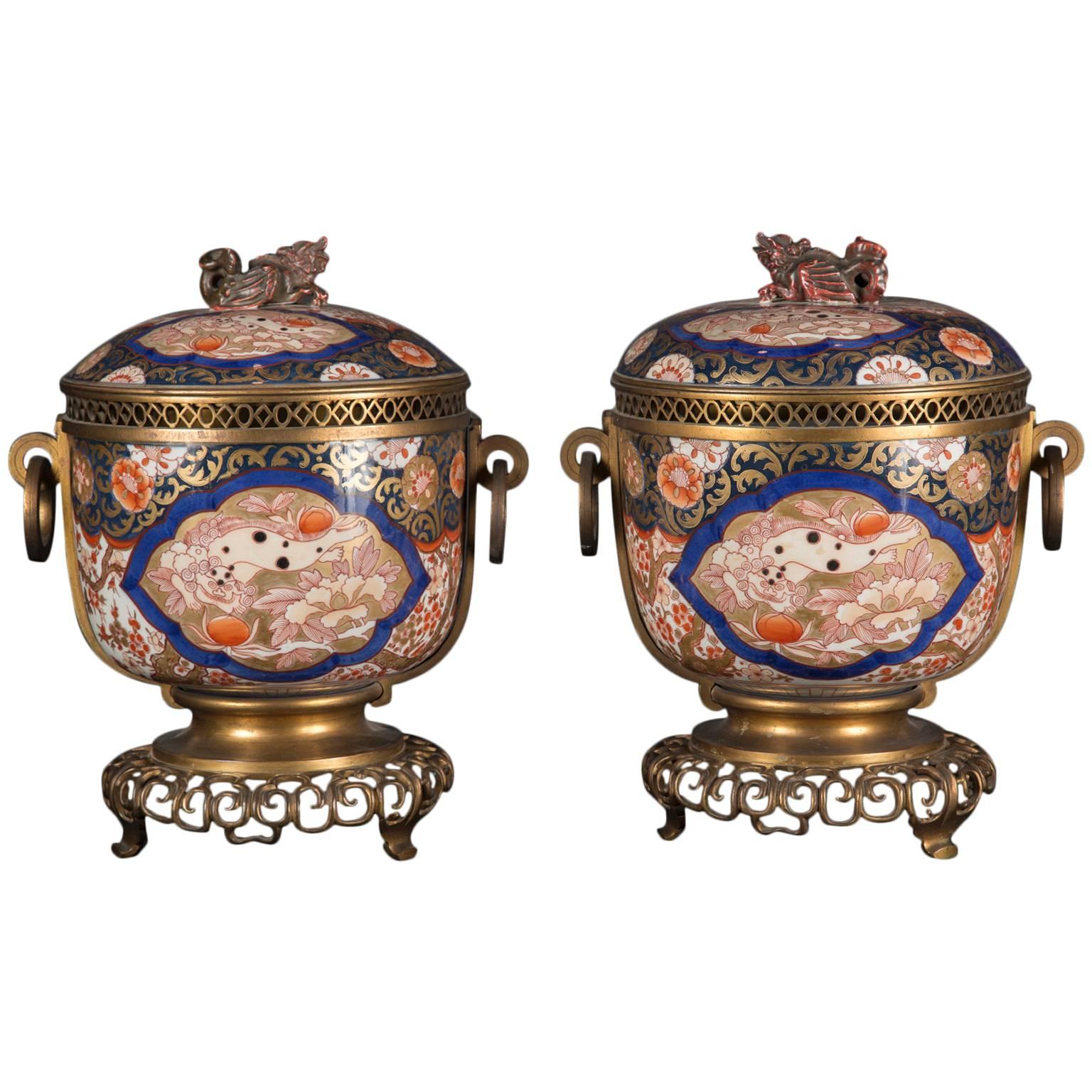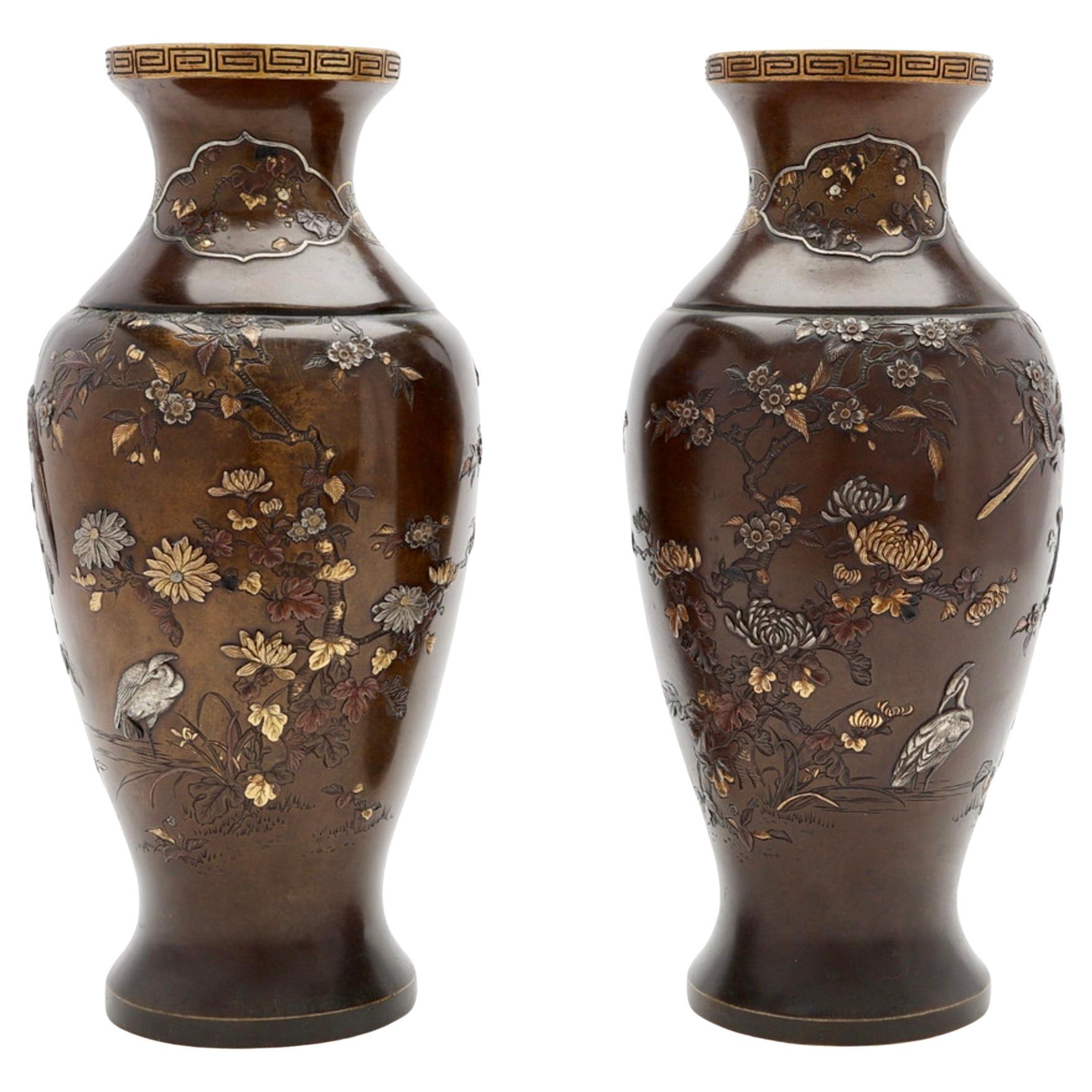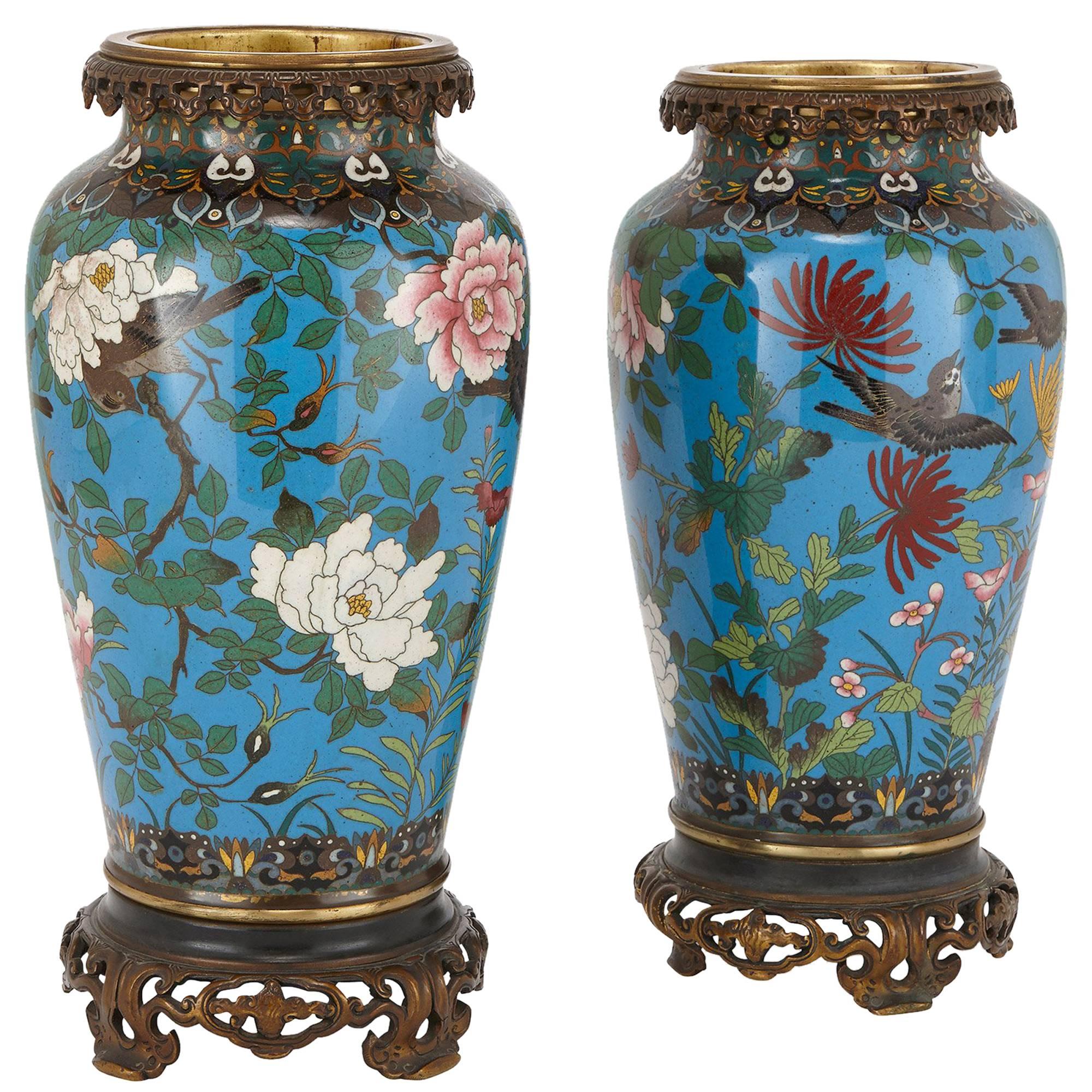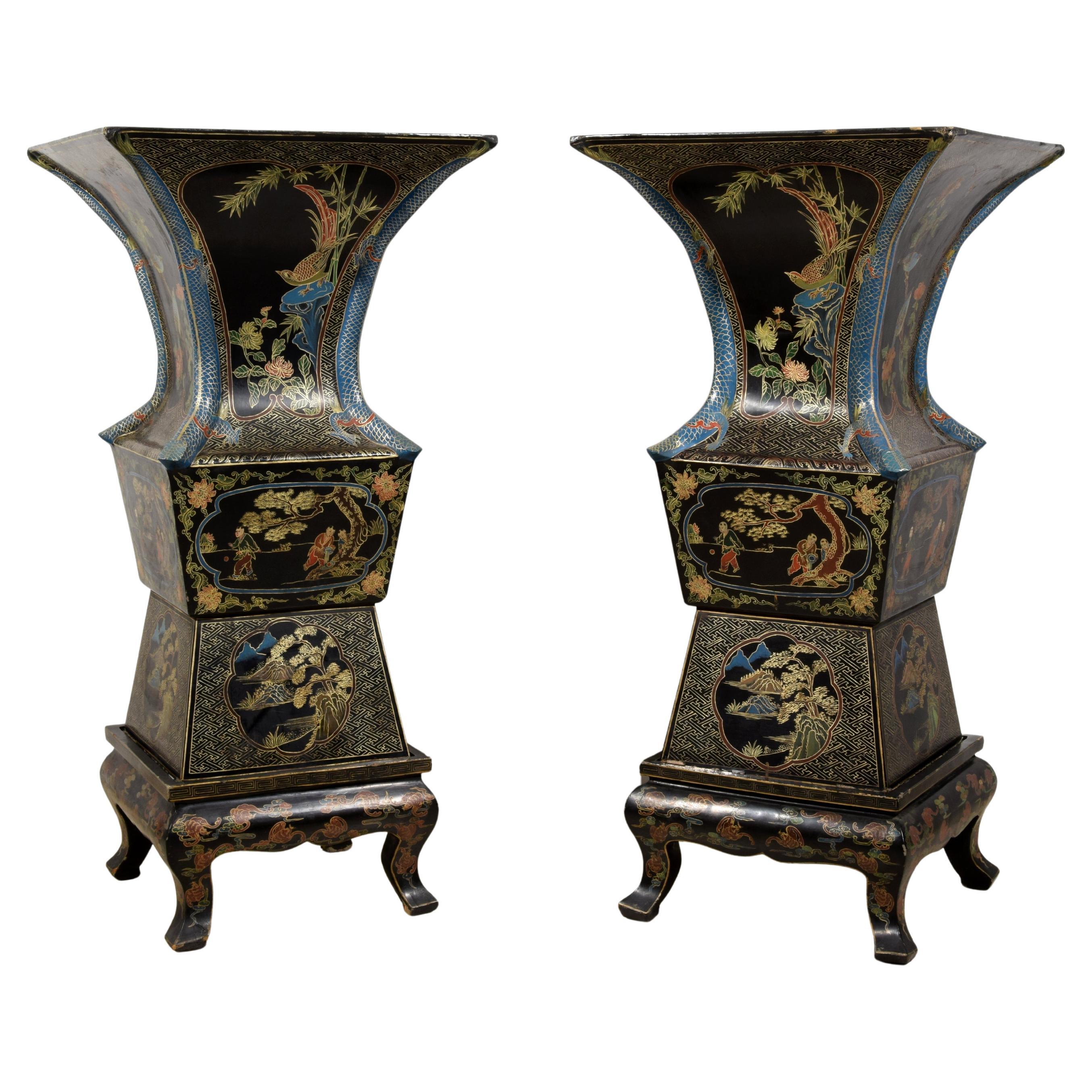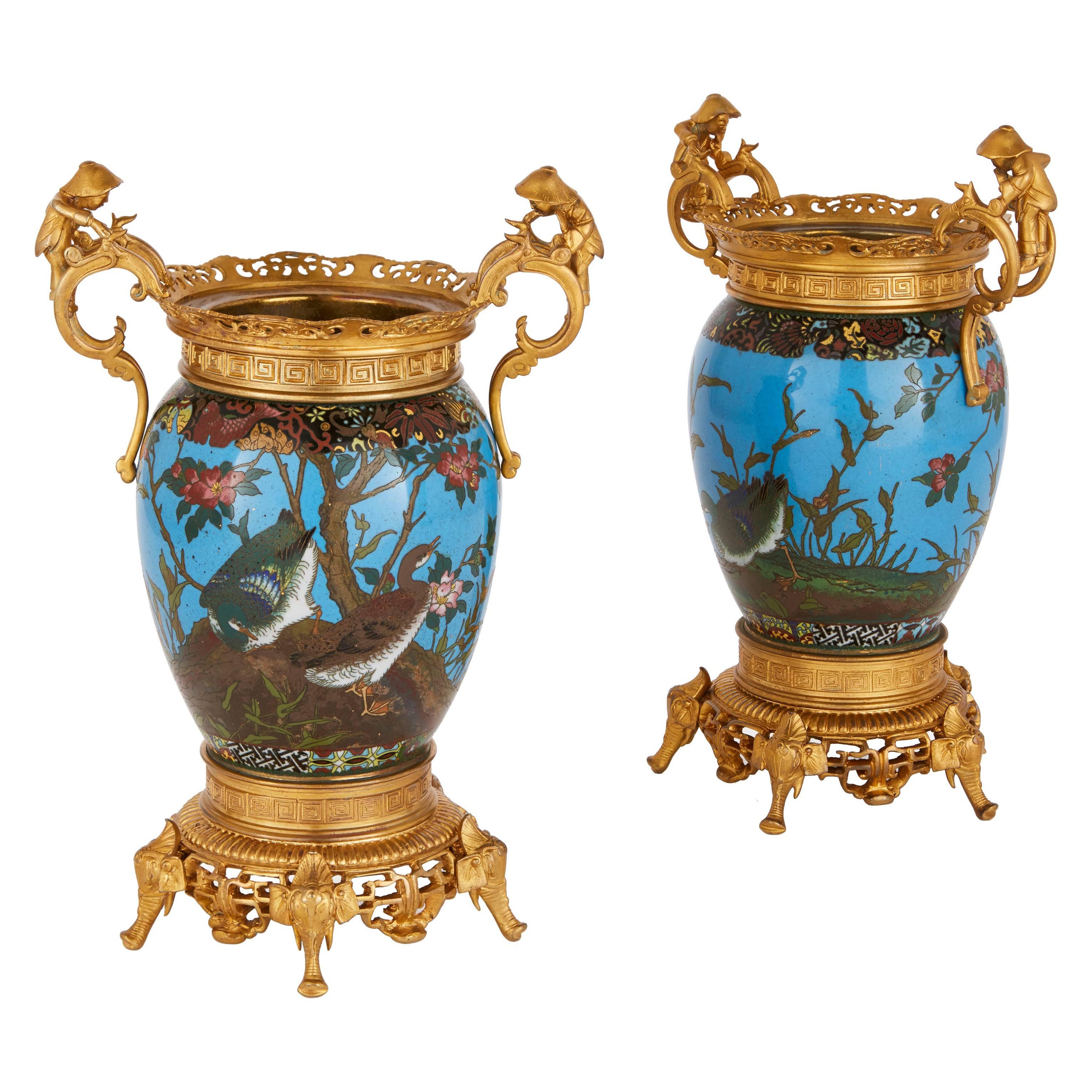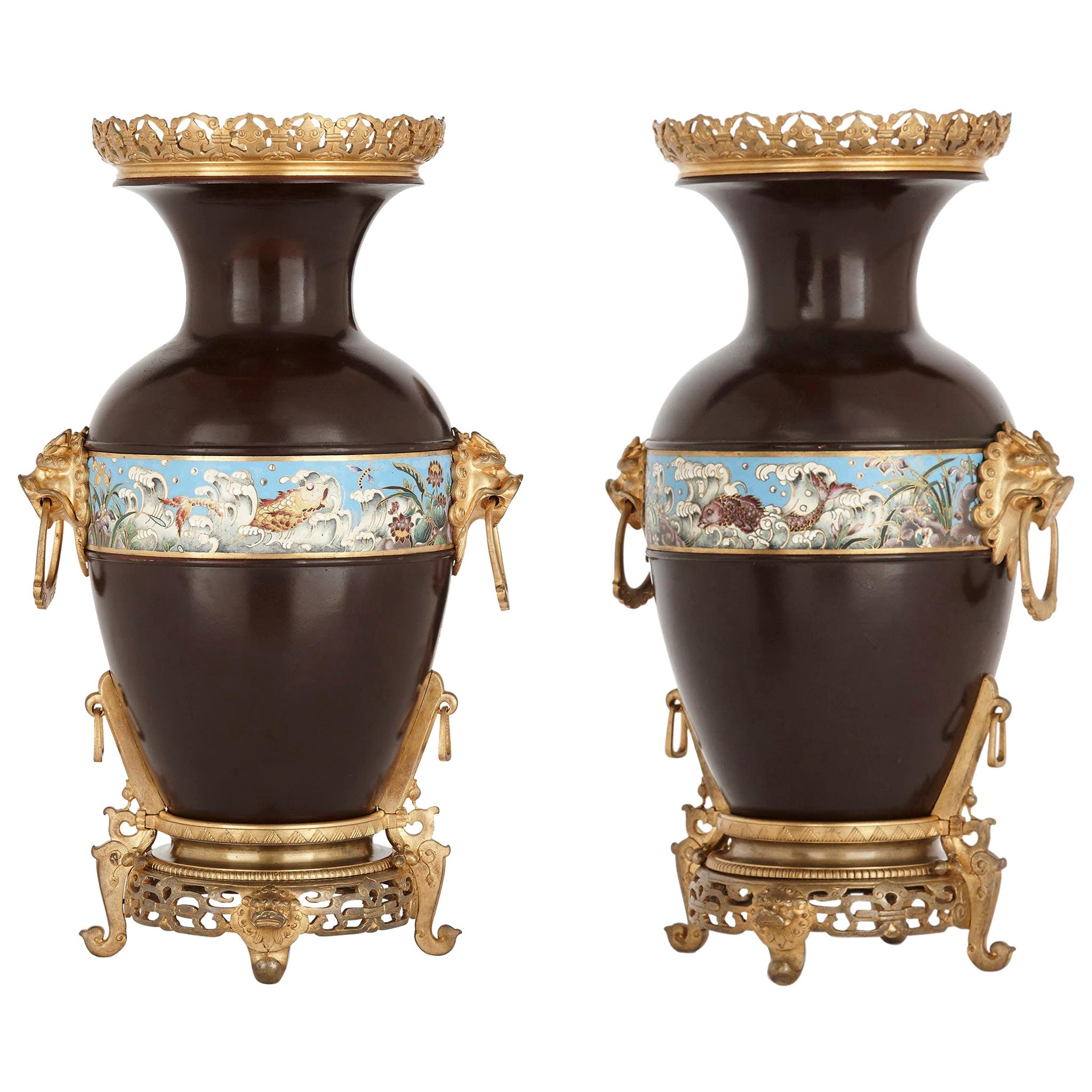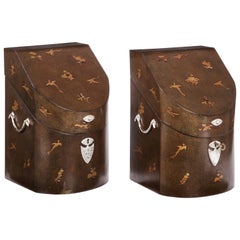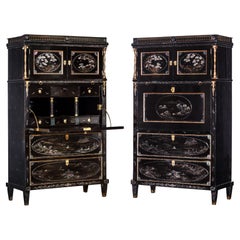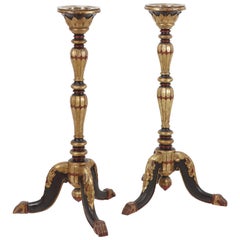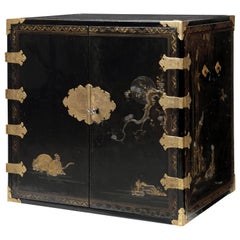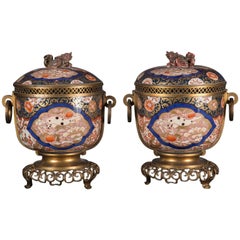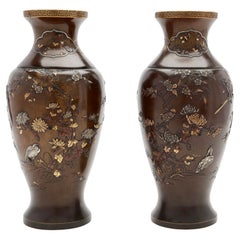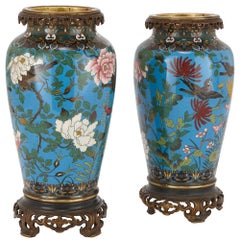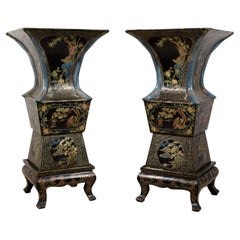Items Similar to Pair of Japanese Lacquer and Mother-of-Pearl Inlaid Knife Urns, circa 1800-1815
Want more images or videos?
Request additional images or videos from the seller
1 of 3
Pair of Japanese Lacquer and Mother-of-Pearl Inlaid Knife Urns, circa 1800-1815
$57,510.89per set
£42,805.18per set
€48,000per set
CA$78,775.54per set
A$87,615.60per set
CHF 45,750.14per set
MX$1,066,188.68per set
NOK 584,299.16per set
SEK 547,969.53per set
DKK 365,407.24per set
Shipping
Retrieving quote...The 1stDibs Promise:
Authenticity Guarantee,
Money-Back Guarantee,
24-Hour Cancellation
About the Item
A rare pair of Kyoto-Nagasaki style lacquer and mother-of-pearl inlaid knife urns
Edo period, early 19th century
Measures: Height 71 x diameter 30 cm
?Formed as urns with vertically lifting covers and elongated finials, revealing fitted green velvet lined interiors for knives, decorated overall with birds, flowering stems, faux-fluting and oval panels with landscapes. The square plinth is raised on four bracket feet. Inside the lifting cover of one of the urns are Japanese characters, supposedly indications of some code by the craftsman.
A closely related knife urn, now in the collection of the Peabody Essex Museum, Salem (inv. E 73115), was acquired in Nagasaki by Captain Samuel Gardner Derby of the Margareth of Salem in 1801. Captain Gardner Derby traded in Nagasaki under charter from the VOC (Vereenigde Oostindische Compagnie), the Dutch East India Company. Between 1797 and 1814 Holland was occupied by the French and from 1811 until 1816 Java by
the English. During these periods practically no Dutch shipping was possible between Holland and Batavia (Jakarta) or between Batavia (Jakarta) and Nagasaki. To maintain a minimum amount of shipping between Batavia (Jakarta) and Nagasaki, between 1797 and 1807, the VOC chartered mainly American ships. American captains and officers ordered and bought mainly lacquered furniture in an American-English style, completely different from what the Dutch up till then had ordered. The present knife urns were possibly also ordered and acquired by Captain Gardner Derby during his stay in Deshima/Nagasaki in 1801.
Another similarly neoclassical shaped knife urn in the collection of the Ashmolean Museum Oxford (inv. 1996.17) appears to be signed by woodworker Kiyotomo koreo tsukuru (Kiyomoto made this). The same name, together with an address in the Sanjo-Teramachi District of Kyoto, has been found inside a fragmentary urn in a private collection. This is an indication that European-style furniture was not only lacquered in Japan but made there as well. This undoubtedly is not only true for knife-urns, but all European- style furniture lacquered in Japan after circa 1800 was made by Japanese furniture makers, after European models or drawings.
- Dimensions:Height: 27.96 in (71 cm)Diameter: 11.82 in (30 cm)
- Sold As:Set of 2
- Style:Anglo-Japanese (Of the Period)
- Materials and Techniques:
- Place of Origin:
- Period:
- Date of Manufacture:1800-1815
- Condition:Wear consistent with age and use.
- Seller Location:Amsterdam, NL
- Reference Number:1stDibs: LU5458226435782
About the Seller
5.0
Recognized Seller
These prestigious sellers are industry leaders and represent the highest echelon for item quality and design.
Established in 1985
1stDibs seller since 2020
23 sales on 1stDibs
Typical response time: 2 hours
- ShippingRetrieving quote...Shipping from: Amsterdam, Netherlands
- Return Policy
Authenticity Guarantee
In the unlikely event there’s an issue with an item’s authenticity, contact us within 1 year for a full refund. DetailsMoney-Back Guarantee
If your item is not as described, is damaged in transit, or does not arrive, contact us within 7 days for a full refund. Details24-Hour Cancellation
You have a 24-hour grace period in which to reconsider your purchase, with no questions asked.Vetted Professional Sellers
Our world-class sellers must adhere to strict standards for service and quality, maintaining the integrity of our listings.Price-Match Guarantee
If you find that a seller listed the same item for a lower price elsewhere, we’ll match it.Trusted Global Delivery
Our best-in-class carrier network provides specialized shipping options worldwide, including custom delivery.More From This Seller
View AllPair of Fine Japanese Export Lacquer Cutlery Knife Boxes, 18th Century
Located in Amsterdam, NL
A pair of fine Japanese export lacquered cutlery boxes
Kyoto or Nagasaki, late 18th century
H. 33.5 x W. 24 x D. 21 cm
The bow-fronted boxes with sloping lids flat at the top are made of hinoki wood (Cypress), coated with Japanese paper and decorated in lacquer with scattered gold birds and flowers on a nashiji background. The Japanese mounts are made of copper and both boxes still have internal partitions to keep the cutlery upright.
The form of these boxes is similar to a pictorial-style knife box in the collection of the Groninger Museum (inv. 1989- 347), dated between 1730 and 1780, but the style of the decoration is more like that on a knife box in the Peabody Essex Museum in Salem (inv. E62271), which was brought to Salem by James Devereux, Captain of the Franklin, in 1799.
Provenance:
Henriette Jeane Christine van Neukirchen, called Nyvenheim (1807- 1849) and Nicolaas Johan Steengracht van Oostcapelle (1806-1866), thence by descent to the last owners, Ludolphine Emilie baronesse Schimmelpenninck van der Oye (1944) married in 1969 to Roland Daniel van Haersma Buma (1944), the last residents of castle Duivenvoorden near Voorschoten and the great-great-granddaughter of Nicolaas Johan Steengracht van Oostcapelle.
There is no evidence that Nicolaas Johan himself, or any of his or his wife’s ancestors had ever been in Japan. However, Nicolaas’ grandfather (Nicolaas Steengracht, 1754-1840) was a director of both the VOC and WIC (West Indies Company...
Category
Antique Late 18th Century Japanese Lacquer
Materials
Silver
A fine pair of Japanese export lacquer secretaires owned by Sir Stamford Raffles
Located in Amsterdam, NL
'The Stamford Raffles Secretaires.'
A pair of Japanese Kyoto-Nagasaki style export lacquer secretaires by ‘Lakwerker Sasaya’ each with the name ‘Ol...
Category
Antique Early 19th Century Japanese Secretaires
Materials
Gold, Brass
$826,719 / set
Free Shipping
Pair of Colonial Lacquered and Gilt Teak Torchères or Candle Stands
Located in Amsterdam, NL
A pair of Indonesian lacquered and gilt teak torchères or candle stands
Probably Jakarta (Batavia), 18th century
Each on three spreading feat with human hand-shaped foot, knobb...
Category
Antique 18th Century Indonesian Dutch Colonial Furniture
Materials
Giltwood
Rare Charming 17th Century Japanese Lacquer Cabinet with Gilt-Bronze Mounts
Located in Amsterdam, NL
A fine Japanese pictoral style lacquer cabinet with gilt-metal mounts
Kyoto, Edo period, 1670-1690
Decorated in Japanese relief lacquer work, black lacquer ground decorated...
Category
Antique Late 17th Century Japanese Furniture
Materials
Bronze
$44,930 Sale Price
25% Off
Free Shipping
Pair of Amsterdam Decorated Japanese Arita Bottles, circa 1700
Located in Amsterdam, NL
Two fine Japanese Arita Amsterdam decorated or 'clobbered' bottles
Edo period late 17th-early 18th century
The smaller one is decorated with a lambrequin and under it, one perched, one flying pheasant and a fly among prunus, peony and bamboo, the larger one with on the belly also one flying, one perched pheasant and a fly and in addition a butterfly amongst tree peony and chrysanthemums under a frieze on the shoulder of cartouches with floral decoration.
?
H. 21 cm, content: 1.4 liter
H. 27.5 cm, content: 2.2 liter
Note:
These bottles arrived undecorated in the Netherlands where they were decorated in the Chinoiserie and Kakiemon style with red, green, blue, black, yellow and aubergine enamels and sometimes with gold.
“Dutch” decorated white Arita bottles are often called “Amsterdam’s bont...
Category
Antique Late 17th Century Dutch Ceramics
Materials
Porcelain
Large Royal Early 17th Century Japanese Lacquer Chest with Gilt-Bronze Mounts
Located in Amsterdam, NL
A large Japanese transitional lacquer chest with gilt-metal mounts
Edo period, early 17th century
The rectangular chest with flat hinged lid decorated in gold, silver, and red ...
Category
Antique Early 17th Century Japanese Blanket Chests
Materials
Bronze
You May Also Like
Pair of 19th Century Japanese Imari Vases with French Bronze Mounts
Located in New Orleans, LA
This gorgeous pair of 19th century Japanese Imari vases are beautifully hand-painted in the classic Imari colors of blue, terra cotta, gold and white. The pair features a Foo dog han...
Category
Antique Mid-19th Century Japanese Ceramics
Materials
Bronze
Pair of Japanese urns. 19th c. Meiji period. Signed.
Located in Stockholm, SE
These pair of Japanese bronze urns from the Meiji period have decorations of birds and flowers. The inlays are made of silver, gilt bronze and shakudo. Both urns are signed at the bo...
Category
Antique Late 19th Century Japanese Metalwork
Materials
Bronze
Pair of Antique Japanese Ormolu Mounted Cloisonné Enamel Vases
Located in London, GB
Of ovoid form with a pierced ormolu rim, decorated throughout with birds, flowers and foliage, raised on pierced ormolu feet; the enamel Japanese, the ormolu French, late 19th centur...
Category
Antique Late 19th Century Japanese Meiji Vases
Materials
Bronze, Enamel
19th Century, Pair of Large Oriental Lacquered Wooden Vases
Located in IT
Pair of Large Oriental Lacquered Wooden Vases, Late 19th Century
Dimensions: cm H 142 x W 69 x D 69. Base cm 51 x 51
This monumental pair of vases was made in Europe towards the end...
Category
Antique Late 19th Century European Japonisme Vases
Materials
Wood
Pair of Antique Japanese Cloisonné Enamel Vases with French Ormolu Mounts
Located in London, GB
Pair of antique Japanese cloisonné enamel vases with French ormolu mounts
Japanese and French, Late 19th Century
Height 30.5cm, width 22cm, depth 17cm
Virtually identical in design,...
Category
Antique Late 19th Century Japanese Vases
Materials
Ormolu, Enamel
Two Chinese Style Enamelled Gilt and Patinated Bronze Urns
Located in London, GB
Two Chinese style enameled gilt and patinated bronze urns
French, circa 1880
Measures: Height 44.5cm, width 27cm, depth 20cm
Each urn, or va...
Category
Antique Late 19th Century French Chinoiserie Vases
Materials
Bronze, Enamel, Ormolu
More Ways To Browse
French Lacquer
The Lacquer Company
Japanese Pearls
Lacquered Wood Panel
French Art 1800
Brass Mother Of Pearls
Asian Panel Lacquer
Japanese Velvet
Japanese Lacquer Panels
Japan Edo Lacquer
Mother Of Pearl Panel
Antique Bird Urns
Antique Asian Mother Of Pearl Furniture
Japanese Antique Wood Birds
Antique Japanese Urns
Rare Antique Knife
Japanese Lacquer Pearl
Japanese Lacquer And Mother Of Pearl
